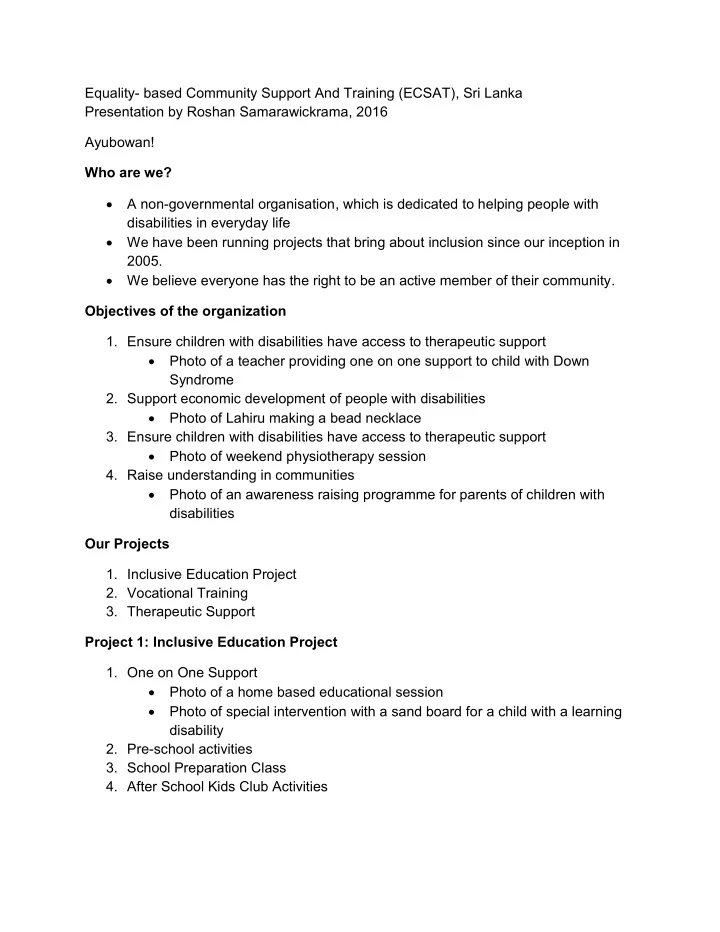

Equality- based Community Support And Training (ECSAT), Sri Lanka Presentation by Roshan Samarawickrama, 2016 Ayubowan! Who are we? A non-governmental organisation, which is dedicated to helping people with disabilities in everyday life We have been running projects that bring about inclusion since our inception in 2005. We believe everyone has the right to be an active member of their community. Objectives of the organization 1. Ensure children with disabilities have access to therapeutic support Photo of a teacher providing one on one support to child with Down Syndrome 2. Support economic development of people with disabilities Photo of Lahiru making a bead necklace 3. Ensure children with disabilities have access to therapeutic support Photo of weekend physiotherapy session 4. Raise understanding in communities Photo of an awareness raising programme for parents of children with disabilities Our Projects 1. Inclusive Education Project 2. Vocational Training 3. Therapeutic Support Project 1: Inclusive Education Project 1. One on One Support Photo of a home based educational session Photo of special intervention with a sand board for a child with a learning disability 2. Pre-school activities 3. School Preparation Class 4. After School Kids Club Activities
What we have achieved 1. Pre- school - 18 2. School Preparation Class - 42 3. After School Kids Club - 116 What do these figures actually mean? Name - Bawesh Age - 12 years Disability - Severely Autistic His story: Bawesh is a severely autistic child who was housebound due his parents ’ lack of knowledge and the stigma around disability. ECSAT could take this child out from his home and support Bawesh and his family to overcome barriers. Photo of Bawesh having one on one support from his teacher Photo of Bawesh having a fruit salad after a group activity Project 2: Vocational Training Project Photo of basic sewing skills training Photo of hearing impaired ladies making Christmas cards Photo of a young man with physical disabilities having computer training Photo of a cookery lesson from a professional chef What we have achieved 1. Basic Vocational Training - 164 2. Production Groups - 10 3. Individual Producers - 9 What do these figures actually mean? Name - Eshani Age - 26 years Her story: Eshani is a beautiful young girl with very strong courage. Due to her disability and other medical circumstances, she lost her voice and mobility skills. Also, her alcoholic father made her life difficult. When ECSAT found her, she was totally bound to her bed and spent a very sad life. ECSAT ’ s intervention restored her happiness and helped her to move up in her life.
Photo of Eshani now, looking very happy Photo of Eshani looking sad, 6 years ago Photo of Eshani at a basic vocational training class in 2010 Photo of Eshani in a group activity Photo of Eshani 4 years ago, gaining her confidence Photo of Eshani 3 years ago, holding a ball and playing with young children Photo of Eshani in April 2015, dressed like a queen in a performance Photo of Eshani in December 2015, posing as a disabled model Photo of Eshani in January 2015, traveling independently in a tuk tuk to work (at ESCAT) Photo of Eshani all ready for work at ESCAT Photo of Eshani on her first day at work at ESCAT Photo of Eshani holding some cloth she’s designed; she has grown so much but still needs support to lead an independent life Project 3: Therapeutic Support Photos of physiotherapy sessions for children with disabilities Photos of speech and language therapy for children with disabilities The REAL situation of severely disabled people in Sri Lanka People with severe disabilities are more vulnerable to being housebound. Due the lack of facilities and the negative attitudes toward disability, this group of people is not welcomed into social activities. They simply have to lie on a bed until they die. Avishka is one example of this. Photo of Avishka, a boy in a wheelchair, 5 years ago Photos of Avishka in 2016 lying in bed; he has no support and has a high risk of being housebound for his entire life. The moral s of Avishka’s story: Nobody deserves to be housebound. Nobody deserves to be denied friends and an education. Thank You!
Recommend
More recommend